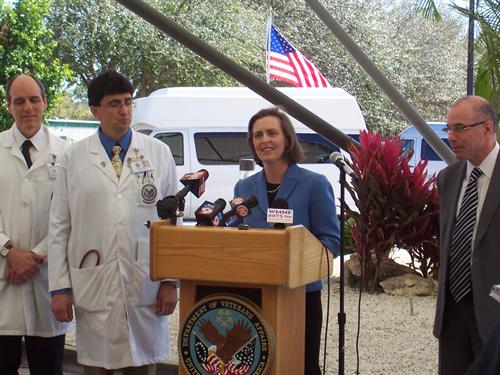Article
Venture to focus on brain injuriesBy William R. Levesque, St. Petersburg Times
Tampa,
February 12, 2008
|
Agustina Guerrero
((813)871-2817)
Haley and USF will study injuries like those suffered by troops in explosions.
At a news conference outside Haley, Rep. Kathy Castor, D-Tampa, said she recently inserted language in the National Defense Authorization Act that gives the Haley-USF partnership "a leg up" in getting some of that $450-million.
Haley and USF will study injuries like those suffered by troops in explosions. The James A. Haley VA Medical Center and the University of South Florida announced on Monday that they are entering into a partnership to research traumatic brain injury. Traumatic brain injury is considered the signature wound of soldiers serving in Iraq who are often exposed to explosions. Up to 20 percent of all returning troops exhibited symptoms of the injury. Congress last year set aside $450-million for research on the condition, which is still poorly understood by the medical community. At a news conference outside Haley, Rep. Kathy Castor, D-Tampa, said she recently inserted language in the National Defense Authorization Act that gives the Haley-USF partnership "a leg up" in getting some of that $450-million. How soon or how much of the money will come to Tampa is not immediately clear. "We have unique assets here," Castor said. "So we're going to use all that leverage to draw down as much of those research dollars that we can." She said it was unique set of circumstances having a major veterans hospital sitting side by side with a major research university like USF. And both are a short drive from MacDill Air Force Base. Also, Haley is home to a polytrauma center, one of just four in the nation where physicians treat some of the most severely wounded veterans. Haley doctors said the partnership contains an education component that allows researchers to "export" their knowledge on treating traumatic brain injury to hospitals around the nation. "The care we provide here will provide the benchmark for the rest of the nation," said Dr. Edward Cutolo, Haley's chief of staff. Traumatic brain injury is sometimes called an invisible wound that can be difficult to diagnose. Even mild cases can alter a person's life, destroying careers and families. "These types of injuries have been coming back from war as long as wars have been out there," said Dr. Steven Scott, director of Haley's polytrauma unit. "And we don't know much more now than we did in 1910 or 1915." Dr. Stephen Klasko, dean of the USF medical school, said Castor's language will force the Pentagon to treat the partnership like a "top tier" institution in its decision making on who gets funding. The money is allocated on a competitive basis. The partnership may create jobs and will help USF in its effort to recruit top researchers, he said. "We're seeing kids, young folks who have injuries they never would have survived" in previous wars, Klasko said. "And now they have the ability not only to live but to lead productive lives." Haley, the nation's busiest VA hospital, may treat more returning veterans from Iraq and Afghanistan than any other VA facility in the nation. |


